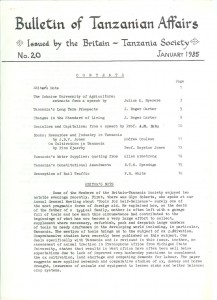Bulletin of Tanzanian Affairs
Issued by the Britain-Tanzania Society
No. 20 January 1985
CONTENTS
Editor’s Note
The Sokoine University of Agriculture: extracts from a speech by Julius K. Nyerere
Tanzania’s Long Term Prospects – J. Roger Carter
Changes in the Standard of Living – J. Roger Carter
Socialism and Capitalism: from a. speech by Prof. A.M. Babu
Books: Resources and Industry in Tanzania by J .D. V. Jones – Andrew Coulson
Ox Cultivation in Tanzania by Finn Kjaerby – Prof. Royston Jones
Tanzania’s Water Supplies: quoting from Allen Armstrong
Tanzania’s Constitutional Amendments – B.T.M. Nyanduga
Resumption of Rail Traffic – P.R. White
EDITOR’S NOTE
Some of the Members of the Britain-Tanzania Society enjoyed two notable evenings recently. First, there was Glyn Roberts, who spoke at our Annual General Meeting about ‘Tools for Self-Reliance’ – surely one of the most pragmatic forms of foreign aid. He explained how, on the death of the father of a typical family, mother is often left with a garage full of tools and how much this circumstance had contributed to the beginnings of what has now become a very large effort to collect, supplement where necessary, refurbish, pack and despatch large numbers of tools to needy craftsmen in the developing world including, in particular, Tanzania. The mention of tools brings us to the subject of ox cultivation. Comprehensive studies have recently been published on this subject. One deals specifically with Tanzania and is reviewed in this issue. Another, an assessment of animal traction in Francophone Africa from Michigan State University, states that results in West Africa have often been well below expectations due to lack of improved crop husbandry practices to complement the ox cultivation, land shortage and competing demands for labour. The paper suggests more applied research and comparative studies of ox, donkey and horse draught, insurance of animals and equipment to lessen risks and better balanced crop systems.
The second notable occasion was a talk by Hon. Lawrence Gama MP, grandson of one of the leaders of the Maji Maji uprising, who since 1977 has been Regional Commissioner in Ruvuma Region and has been visiting Britain. He was happy to tell us that Ruvuma had been able to produce a record (since 1974) crop of 420,000 tonnes of maize this year. He attributed this partly to the use of fertiliser, closer spacing and better seed and also referred to the growing practice of interplanting with Sunn hemp (Crotalaria juncea), a nitrogenous legume, to reduce the fertiliser requirement. In discussion Mr. Gama did not disguise the problems he faces in administering his remote Region. Communications remained a major problem, though the completion of the Makambako to Songea road with UK aid at the end of 1985 would greatly ease access to the Region. In education we learned that the national ratio of 2.6% of primary school leavers able to gain entry to a secondary school meant, in the case of Ruvuma Region, only 300 places for 20,000 primary school leavers.
We wish to record the visit between 3rd. and 13th. December of an important delegation from Zanzibar headed by Hon. Seif Shariff Hamad MP, Chief Minister of Zanzibar and including also Hon. Taimur Saleh Juma MP, Minister for Finance, Ndugu Abdullah Said Haji MP, a member of the Zanzibar House of Representatives, Ndugu Abdullah Juma Khatib, Governor of the Zanzibar People’s Bank and Ndugu Mohammed Mwinyi Mzale, Principal Secretary in the Office of the Chief Minister. The Britain-Tanzania Society cooperated with the Royal Commonwealth Society in a meeting addressed by the Chief Minister on 5th. December.
Elsewhere in this issue is part of a press report in the ‘Daily News’ of an address to the University of Dar es Salaam by Ndugu Abdulrahman Mohammed Babu, one of the leaders of the Zanzibar revolution and a former Minister in the Tanzanian Government, now teaching as a Professor of International Relations in the University of Massachusetts.
I recently had occasion to visit the Tanzania High Commission in London in its building at 43, Hertford Street, London W1Y 7TF. I thought it might be useful for readers to know who is working there and so we are publishing in this issue a list of the present members of the staff, including two who are working in the Tanzania Tourist Office at 77, South Audley Street, London W1Y 5TA.
It may interest our readers to know that we exchange copies of our respective journals with our fellow Tanzanian societies in other European countries. The names of the societies and their journals are as follows:
Amities Franco-Tanzaniennes- ‘Urafiki Tanzania’
Svensk-Tanzaniska Foreningen- ‘Habari: Information om Tanzania’
Norge-Tanzania Foreningen- ‘Hodi’
Dansk-Tanzaniansk Venskabsforening (Dantan)- ‘Kumekucha’
We are grateful for receiving these journals and find ourselves quoting from them, or reproducing their articles, from time to time. We like the Danish title ‘Kumekucha’ (The Dawn has Come) and wonder whether there might be a better title for our Bulletin. If you agree, do send me your suggestions.
David Brewin
Editor
14B, Westbourne Grove Terrace,
London W2 5SD.

